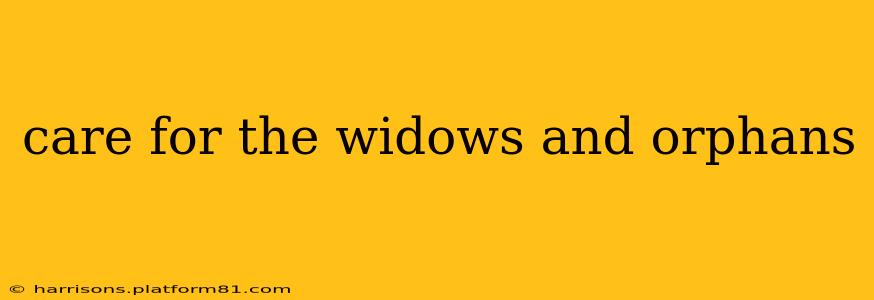Caring for widows and orphans has been a cornerstone of social responsibility across cultures and throughout history. This enduring concern reflects a fundamental human empathy for those rendered vulnerable by loss and societal structures. But what does caring for widows and orphans actually entail, and how has this evolved over time? This comprehensive look will explore the historical context, modern challenges, and various approaches to addressing the needs of this vulnerable population.
What Does "Caring for Widows and Orphans" Entail?
The phrase "caring for widows and orphans" encompasses a broad spectrum of support, both material and emotional. It goes beyond simply providing financial aid, although that is a crucial aspect. It includes:
- Financial Support: This is often the most immediate need. Widows may have lost their primary source of income, leaving them struggling to meet basic needs like food, shelter, and healthcare for themselves and their children.
- Emotional Support: Grief, isolation, and the overwhelming burden of raising children alone can be emotionally devastating. Access to counseling, support groups, and a sense of community is vital.
- Legal and Advocacy Services: Navigating legal processes related to inheritance, property rights, and child custody can be complex and daunting. Legal assistance and advocacy are crucial in ensuring widows and orphans are protected from exploitation.
- Education and Skills Training: Empowering widows and orphans through education and skills development is essential for their long-term economic independence and well-being.
- Healthcare Access: Ensuring access to quality and affordable healthcare, including mental health services, is paramount.
Historically, How Have Societies Cared for Widows and Orphans?
Throughout history, various societal structures and religious institutions have played significant roles in supporting widows and orphans.
- Religious Institutions: Many religions have emphasized the importance of caring for the vulnerable, with religious orders and charities often providing significant support. From monasteries providing refuge to church-sponsored orphanages, faith-based organizations have historically played a vital role.
- Community Support: In many traditional societies, extended family networks and community structures provided crucial support, with relatives and neighbors sharing responsibilities and resources.
- Governmental Initiatives: Over time, governments have increasingly taken on responsibility, implementing social welfare programs like pensions, orphanages, and child support systems. However, the extent and effectiveness of these programs vary greatly across countries and regions.
What are the Modern Challenges in Caring for Widows and Orphans?
While progress has been made, significant challenges remain in effectively caring for widows and orphans in the modern world:
- Poverty and Inequality: Poverty remains a primary driver of vulnerability, with widows and orphans often facing extreme hardship due to lack of access to resources and opportunities.
- Social Stigma and Discrimination: Widows and orphans may face social stigma and discrimination, further marginalizing them and limiting their access to support.
- Conflict and Displacement: Conflict and displacement exacerbate existing vulnerabilities, leaving widows and orphans facing immense challenges in the aftermath of violence and upheaval.
- Lack of Access to Resources: Lack of access to education, healthcare, and legal services disproportionately affects widows and orphans, perpetuating a cycle of poverty and disadvantage.
- The Impact of HIV/AIDS: The HIV/AIDS pandemic has left millions of orphans worldwide, placing immense strain on support systems and creating a critical need for assistance.
How Can We Effectively Support Widows and Orphans Today?
Addressing the needs of widows and orphans requires a multi-faceted approach:
- Strengthening Social Safety Nets: Governments must invest in robust social safety nets that provide adequate financial support, healthcare, and education to vulnerable families.
- Empowering Widows: Providing widows with economic opportunities through skills training, microfinance initiatives, and access to markets is crucial for their independence.
- Protecting Children's Rights: Ensuring that orphaned children have access to quality education, healthcare, and a safe and nurturing environment is essential.
- Promoting Community-Based Support: Supporting and strengthening community-based initiatives that provide social support, care, and resources to vulnerable families is crucial.
- Advocating for Policy Changes: Advocating for policy changes that address the root causes of vulnerability, such as poverty and inequality, is essential for long-term change.
- Supporting Charitable Organizations: Donating to or volunteering with reputable charitable organizations working to support widows and orphans is a vital way to make a difference.
What Resources Are Available to Help Widows and Orphans?
Numerous organizations worldwide are dedicated to supporting widows and orphans. Researching local and international charities working in this field can help individuals find ways to contribute to this critical cause. Many organizations provide direct support services, while others focus on advocacy and policy change. (Note: This response does not include specific links to organizations to avoid potential biases or the appearance of endorsements.)
Caring for widows and orphans is not merely a charitable act; it is a fundamental expression of human compassion and a vital component of building just and equitable societies. By understanding the challenges and working together, we can create a world where these vulnerable individuals are empowered to thrive.
